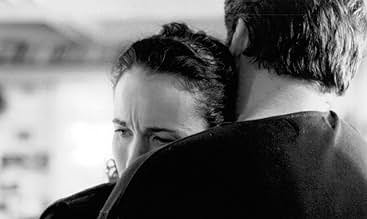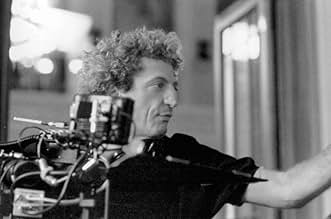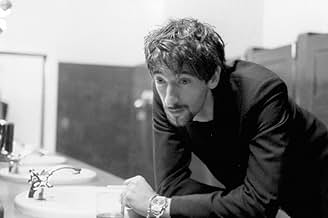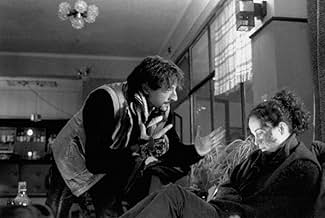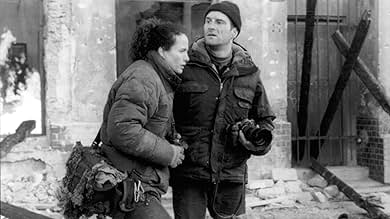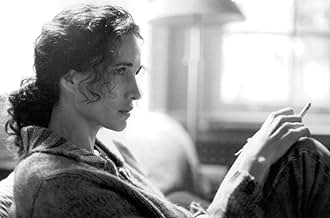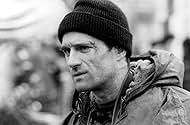CALIFICACIÓN DE IMDb
7.0/10
6.9 k
TU CALIFICACIÓN
Agrega una trama en tu idiomaWhen a Newsweek photojournalist disappears in war-torn Yugoslavia, his wife travels to Europe to find him.When a Newsweek photojournalist disappears in war-torn Yugoslavia, his wife travels to Europe to find him.When a Newsweek photojournalist disappears in war-torn Yugoslavia, his wife travels to Europe to find him.
- Premios
- 3 premios ganados y 1 nominación en total
Scott Anton
- Cesar Lloyd
- (as Scott Michael Anton)
Argumento
¿Sabías que…?
- TriviaCroatian city of Vukovar was defended by around 1,800 lightly armed soldiers of the Croatian National Guard (ZNG) and civilian volunteers, against as many as 36,000 JNA (Yugoslav People's Army) soldiers and Serb paramilitaries equipped with heavy artillery.
- ErroresDuring the battle, when they are hiding in the dead woman's house, the Serbian/Yugoslav tanks carry the Croatian national flag with a red star.
- Citas
Yeager Pollack: There are only two different types of people in this world. Those who have seen the war, and those who haven't.
- Versiones alternativasFor the United States version, the film's length was reduced by about 5 minutes; it also features a new score by Cliff Eidelman. All interview footage was cut. As well as a few short shots. The biggest cut is the one which announces the death of Cathy, the French journalist. The ending has a different voice-over. The only addition for the American version is when Sarah first says in the cafe "He's not dead".
- ConexionesReferenced in Film Geek (2005)
Opinión destacada
This movie is simply made for watching on video or DVD. Here's the plan--the first time through, watch all of it. But on subsequent viewings, just watch the stuff that happens in Yugoslavia.
Except for the men's room scene after the Awards Banquet.
This movie is really, really frustrating to watch because you can't help but feel that the directors and other creative parties associated with the actual film were very dedicated to telling the story of the journalists and photographers who were trying to bring the truth of what was happening in the early days of the ethnic cleansing in the former Yugoslavia to the screen. They were fascinated by the people who would willingly risk their lives to obtain images of the horrors and atrocities being carried out to the rest of the world, and what motivated them--made them tick. And they were enamoured of the character of Kyle Morris, as portrayed by Adrien Brody, and wished to showcase him in some way in order to drive the point home--that people like him were brave and admirable, no matter what their personal demons and failings.
Unfortunately for those of us who were hooked on this POV, they were also hamstrung, utterly, by the source material, which was a love story about a woman who would not believe her husband was dead, and whose dedication to finding him and whose devotion to him was convincing enough to cause persons such as are described in the preceding paragraph to risk life and limb to try to reunite this couple.
I don't want to use this space to snark. It's unseemly, given the seriousness of the subject matter. What I want to highlight is the way in which one of the performances affected me. The central figure of this movie from a standpoint of character arc is not Harrison, or his wife, Sarah, but Kyle Morris. We first see Kyle at a Pulitzer Awards dinner, where a grief-stricken, coke-addled Kyle Morris goes off on the Harrison Lloyd character. It's a show-stopper, and drenches everything else that happens in Yugoslavia with layers and layers of bitter irony.
The great stuff in this is movie is all about Adrien Brody's character Kyle Morris. This is probably the sort of character that a young actor just dreams of getting his teeth into. Kyle is one of those bundles of contradictions and contrasts that fascinates endlessly. He is an angry, foul-mouthed swaggerer with the gentle hands and soul of a poet, and a kind heart too easily touched. He is a drug user, which is usually portrayed as a character defect which goes along with being weak or afraid to face reality, but in his case, it is probably more a result of his trying to cope with having too MUCH courage and desire to walk into the bowels of real-life hells, like war-torn Yugoslavia. He is both cocksure and certain, and insecure, terrified he will never get recognized for what he is doing in trying to record the truth. He takes rebellious pride in being an outsider, but he churns with jealous resentment against those who seem to have "made it". This character is BRAVE, quick, resourceful, clever, with a crackling energy that suffuses every line, every expression, every move he makes. Brody brings a wild animal's instinctive quickness and 360 degree awareness of the environment to the role; you can almost see his large but sensitive nostrils quiver as he tests the wind for the scent of danger, and the way to safety. If I were going deep into the heart of the battle zone with nothing more than a camera bag and a sense of purpose, I would want no one else to take me there. When he wraps his arm around Sarah, and tells her to move, she obeys. I would, too. He seems to be tapped in to the undercurrents that flow beneath the reality that they see and hear around them, and sense shifts in the flow and direction that the others cannot, and acts on a combination of instinct and intelligence to get Sarah into a city which has become a charnel house where no badge or profession is respected or spared from the snipers and the bayonets.
I was fascinated by this character. It was the sort of portrayal that made one want to know more--what drives someone like that? What was his childhood like? Why did he risk all for someone like Sarah?
Unfortunately, this portrayal and character threw the whole film off-balance, and made the putative heroine seem self-absorbed and unlikable in the end.
I recommend this movie for the brilliant footage of the journalists and Sarah working their way through war-torn Yugoslavia, for the harrowing urban combat scenes, and for Brody's performance.
I can't, however, give it more than 8 stars, since it committed the primary infraction of rendering its heroine unlikable in certain ways, without redemption or the change brought about by a true character arc.
Also, Harrison and Sarah's son was sort of creepy. Sorry, but there it is.
Except for the men's room scene after the Awards Banquet.
This movie is really, really frustrating to watch because you can't help but feel that the directors and other creative parties associated with the actual film were very dedicated to telling the story of the journalists and photographers who were trying to bring the truth of what was happening in the early days of the ethnic cleansing in the former Yugoslavia to the screen. They were fascinated by the people who would willingly risk their lives to obtain images of the horrors and atrocities being carried out to the rest of the world, and what motivated them--made them tick. And they were enamoured of the character of Kyle Morris, as portrayed by Adrien Brody, and wished to showcase him in some way in order to drive the point home--that people like him were brave and admirable, no matter what their personal demons and failings.
Unfortunately for those of us who were hooked on this POV, they were also hamstrung, utterly, by the source material, which was a love story about a woman who would not believe her husband was dead, and whose dedication to finding him and whose devotion to him was convincing enough to cause persons such as are described in the preceding paragraph to risk life and limb to try to reunite this couple.
I don't want to use this space to snark. It's unseemly, given the seriousness of the subject matter. What I want to highlight is the way in which one of the performances affected me. The central figure of this movie from a standpoint of character arc is not Harrison, or his wife, Sarah, but Kyle Morris. We first see Kyle at a Pulitzer Awards dinner, where a grief-stricken, coke-addled Kyle Morris goes off on the Harrison Lloyd character. It's a show-stopper, and drenches everything else that happens in Yugoslavia with layers and layers of bitter irony.
The great stuff in this is movie is all about Adrien Brody's character Kyle Morris. This is probably the sort of character that a young actor just dreams of getting his teeth into. Kyle is one of those bundles of contradictions and contrasts that fascinates endlessly. He is an angry, foul-mouthed swaggerer with the gentle hands and soul of a poet, and a kind heart too easily touched. He is a drug user, which is usually portrayed as a character defect which goes along with being weak or afraid to face reality, but in his case, it is probably more a result of his trying to cope with having too MUCH courage and desire to walk into the bowels of real-life hells, like war-torn Yugoslavia. He is both cocksure and certain, and insecure, terrified he will never get recognized for what he is doing in trying to record the truth. He takes rebellious pride in being an outsider, but he churns with jealous resentment against those who seem to have "made it". This character is BRAVE, quick, resourceful, clever, with a crackling energy that suffuses every line, every expression, every move he makes. Brody brings a wild animal's instinctive quickness and 360 degree awareness of the environment to the role; you can almost see his large but sensitive nostrils quiver as he tests the wind for the scent of danger, and the way to safety. If I were going deep into the heart of the battle zone with nothing more than a camera bag and a sense of purpose, I would want no one else to take me there. When he wraps his arm around Sarah, and tells her to move, she obeys. I would, too. He seems to be tapped in to the undercurrents that flow beneath the reality that they see and hear around them, and sense shifts in the flow and direction that the others cannot, and acts on a combination of instinct and intelligence to get Sarah into a city which has become a charnel house where no badge or profession is respected or spared from the snipers and the bayonets.
I was fascinated by this character. It was the sort of portrayal that made one want to know more--what drives someone like that? What was his childhood like? Why did he risk all for someone like Sarah?
Unfortunately, this portrayal and character threw the whole film off-balance, and made the putative heroine seem self-absorbed and unlikable in the end.
I recommend this movie for the brilliant footage of the journalists and Sarah working their way through war-torn Yugoslavia, for the harrowing urban combat scenes, and for Brody's performance.
I can't, however, give it more than 8 stars, since it committed the primary infraction of rendering its heroine unlikable in certain ways, without redemption or the change brought about by a true character arc.
Also, Harrison and Sarah's son was sort of creepy. Sorry, but there it is.
- surreyhill
- 28 abr 2003
- Enlace permanente
Selecciones populares
Inicia sesión para calificar y agrega a la lista de videos para obtener recomendaciones personalizadas
Detalles
- Fecha de lanzamiento
- Países de origen
- Sitios oficiales
- Idiomas
- También se conoce como
- Врятувати Харрісона
- Locaciones de filmación
- Productoras
- Ver más créditos de la compañía en IMDbPro
Taquilla
- Presupuesto
- USD 8,000,000 (estimado)
- Total en EE. UU. y Canadá
- USD 1,871,025
- Fin de semana de estreno en EE. UU. y Canadá
- USD 867,635
- 17 mar 2002
- Total a nivel mundial
- USD 3,033,646
- Tiempo de ejecución2 horas 10 minutos
- Color
- Mezcla de sonido
- Relación de aspecto
- 2.35 : 1
Contribuir a esta página
Sugiere una edición o agrega el contenido que falta

Principales brechas de datos
What is the Spanish language plot outline for Harrison's Flowers (2000)?
Responda

